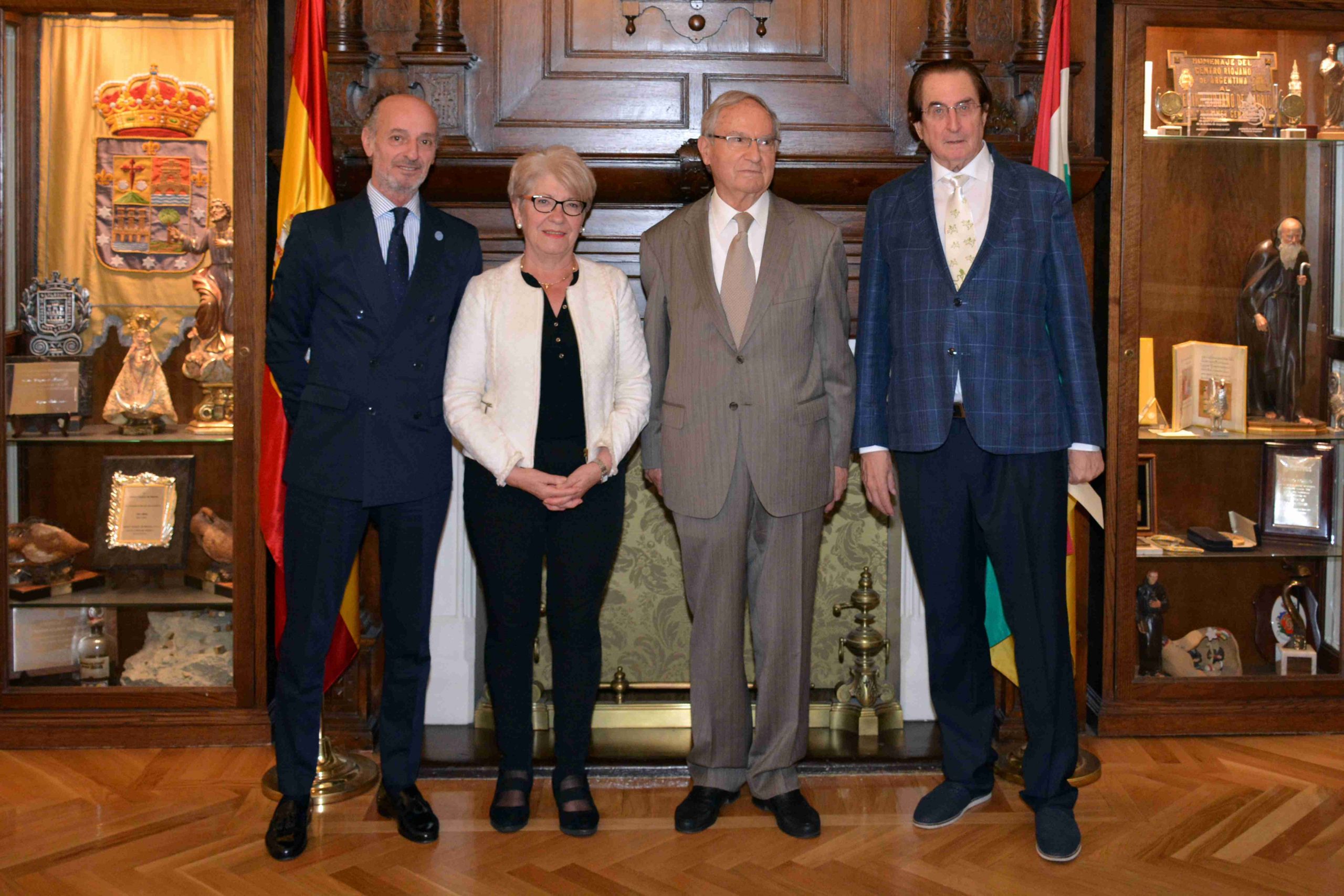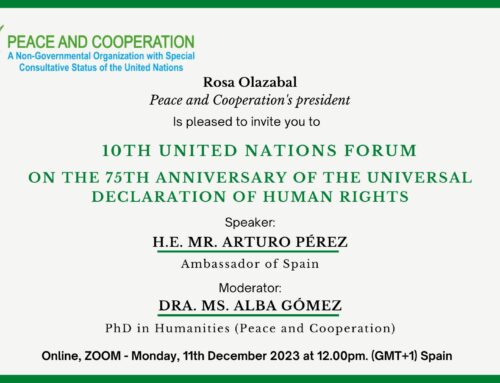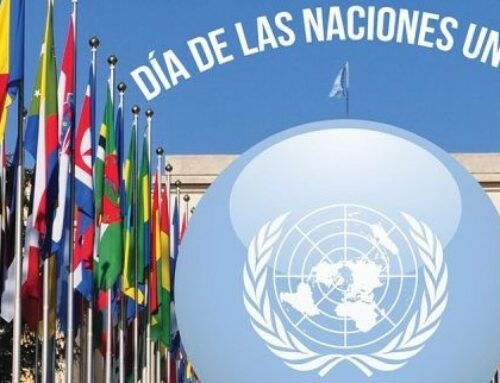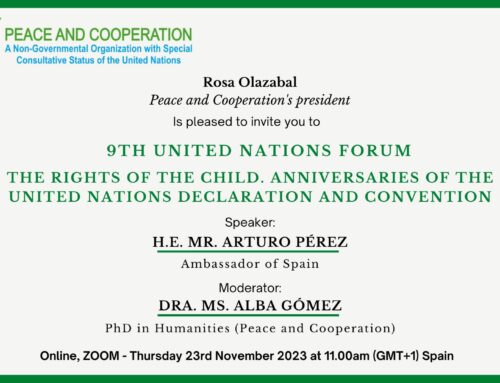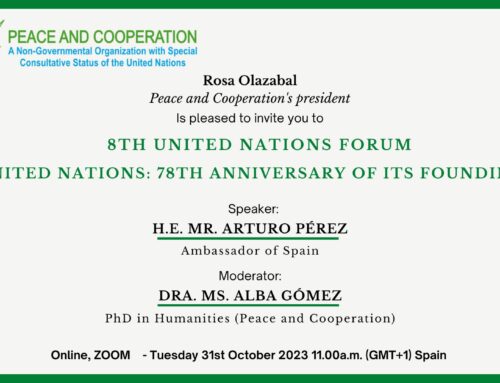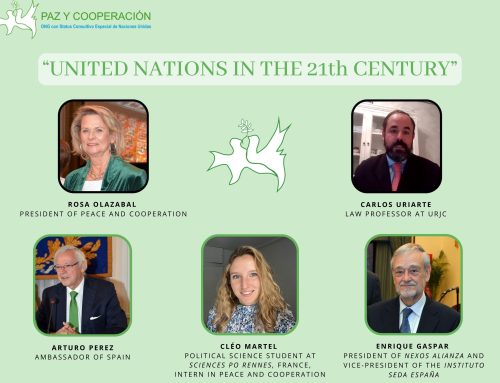Yesterday, February 20, 2019, the second conference of the United Nations Forum organized by Peace and Cooperation jointly with the Centro Riojano in Madrid was held at the Centro Riojano in Madrid. The series of conferences began last February 6, addressing the relevance of global tourism and the challenges it entails, given by the Deputy Secretary General of the World Tourism Organization, Mr. Jaime Alberto Cabal.
This second one was about “The Chinese Prodigy” of the hand of Don Marcelo Muñoz, president of Catedra China. A man of great path and excellence with a good background of economic, commercial and philosophical formation, who in 1978 constituted the first Spanish consulting company, dedicated exclusively to the Chinese market and opened the first Spanish office in China. He was also a speaker and writer on the Chinese reality, its civilization and its future.
The Conference began with Gloria Martínez, secretary general of the Governing Board of the Centro Riojano, who apologised for the absence of the president, who was unable to attend due to health reasons. Gloria introduced the speakers and it was Juan Ignacio Vecino, director of Patrimonio Actual, who explained the relevance of the China Chair and gave way to Joaquín Antuña, president of Peace and Cooperation who introduced our speaker, Don Marcelo Muñoz, explaining his professional profile and his great journey as a deep connoisseur of China that has proven the great Chinese prodigy from Deng Xiaoping to the present day.
Don Marcelo Muñoz began with an encouraging sentence: “The Chinese prodigy is not a prodigy, there are many prodigies”. He told us from his personal experiences, how he arrived in China in the 80’s, and that the housing deficit was 100 million, and that in only 40 years 190 million houses had been built, demonstrating the change and development of China in just four decades. The data offered was revealing – in the 1980s university students were scarce, and today in 2018 there are a total of 42 million university students, representing 42% of young people, with the construction of more than 3,000 universities. The data is a little scary, isn’t it?
Since the reform of Deng Xiaoping, communist structures have been dismantled in China, and today it is a capitalist country, where 70% of the companies are private and have an accelerated economic growth of 6.5%. As observed in the data, when Don Marcelo arrived in China in 1978, in terms of GDP, China was in the position 120. In less than forty years, in 2010, China obtained the second position, therefore becoming without a doubt a great global power. Without a doubt, the consequences of this reform are astonishing: in 40 years more than 700 million people have been lifted out of poverty, GDP has multiplied by 80, per capita income by 40, and 96% of the population is literate.
All these reforms have been reflected in education, science, the Made in China 2025 Plan, information technology, the accelerated development of artificial intelligence, trade (since 2014 the first commercial power and a global investor) and tourism (140 million tourists with a high economic level emerge in 2018). Showing without doubt that in just 40 years China has undergone a great social, economic and political transformation of history and at the same time being the most populous country.
But how do you explain this? What are the keys? According to Don Marcelo Muñoz, the keys to dazzling development are three: 1) politics in the command post, 2) planning, as they work for the next generations and 3) the brain, where there are more than 500 centers of thought that elaborate, criticize and propose governments. But despite all this, China still has many challenges ahead, such as achieving liberal democracy, reducing economic and gender inequality, and contributing to paralyzing climate change.
So where does China take us? China is currently not an emerging power, but emerged, or as many authors defend, re-emerged, global leader in economic growth, in knowledge, in science and technology, in international trade and in multilateralism.
Something that astonishes the West, which does not know how to act in the face of this economic model, based on a socialism with Chinese characteristics and a political model based on meritocracy.
According to Don Marcelo, in the face of this situation, the West would have to descend from its pedestal of world domination, and not try to govern a world of which it no longer has control, while at the same time China should have a greater presence in the international system in order to contribute its peculiarities and, at the same time, accept its shortcomings. Likewise, the European Union, an actor currently reduced by Brexit, should unify more than ever and rise stronger defending the values that created it. Undoubtedly, in the current international system, a “dialogue of civilizations” between the West and the Confucian world is needed in order to carry out global governance.

